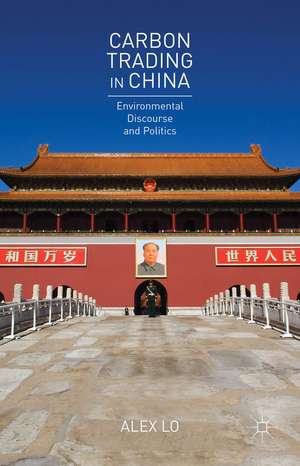Carbon Trading in China: Environmental Discourse and Politics
Autor Alex Loen Limba Engleză Hardback – 17 dec 2015
Preț: 638.57 lei
Preț vechi: 751.25 lei
-15% Nou
Puncte Express: 958
Preț estimativ în valută:
122.21€ • 127.11$ • 100.89£
122.21€ • 127.11$ • 100.89£
Carte tipărită la comandă
Livrare economică 15-29 aprilie
Preluare comenzi: 021 569.72.76
Specificații
ISBN-13: 9781137528995
ISBN-10: 1137528990
Pagini: 192
Ilustrații: XV, 172 p.
Dimensiuni: 140 x 216 x 16 mm
Greutate: 0.37 kg
Ediția:1st ed. 2015
Editura: Palgrave Macmillan UK
Colecția Palgrave Macmillan
Locul publicării:London, United Kingdom
ISBN-10: 1137528990
Pagini: 192
Ilustrații: XV, 172 p.
Dimensiuni: 140 x 216 x 16 mm
Greutate: 0.37 kg
Ediția:1st ed. 2015
Editura: Palgrave Macmillan UK
Colecția Palgrave Macmillan
Locul publicării:London, United Kingdom
Cuprins
1.New Episode
2.Political Economy of Carbon Trading
3.Political and Policy Background
4.Who is leading? State or finance?
5.Policy Change, Discourse, and Storyline
6.The Discourse of State Power, Sovereignty, and Carbon
7.Historical Parallels, Recurring Storylines
8.The End of History?
2.Political Economy of Carbon Trading
3.Political and Policy Background
4.Who is leading? State or finance?
5.Policy Change, Discourse, and Storyline
6.The Discourse of State Power, Sovereignty, and Carbon
7.Historical Parallels, Recurring Storylines
8.The End of History?
Recenzii
A masterful account of how and why carbon trading has come to the forefront in China. This book is packed with insights into Chinese climate policy and Chinese government in general, showing how climate policy is inextricably linked to a discourse of nationalism and state-led development.' – John S. Dryzek, Centenary Professor and Australian Research Council Laureate Fellow, University of Canberra, Australia
'Alex Lo's new book is a timely and much needed contribution to the field of climate change mitigation policy. As the top ranked carbon polluting nation, the world's second largest economy and a developing economy working hard to eliminate the scourge of poverty, China's adoption of carbon trading as a mitigation policy instrument is of historic significance. Dr Lo's expert analysis of the economic dimension of China's carbon trading policies is enriched by a persuasive and critical analysis of its history and geopolitical roles.' – Brendan Mackey, Professor and Director, Griffith Climate Change Response Program, Griffith University, and Regional Councilor for Oceania, International Union for Conservation of Nature, Australia
'Alex Lo's new book is a timely and much needed contribution to the field of climate change mitigation policy. As the top ranked carbon polluting nation, the world's second largest economy and a developing economy working hard to eliminate the scourge of poverty, China's adoption of carbon trading as a mitigation policy instrument is of historic significance. Dr Lo's expert analysis of the economic dimension of China's carbon trading policies is enriched by a persuasive and critical analysis of its history and geopolitical roles.' – Brendan Mackey, Professor and Director, Griffith Climate Change Response Program, Griffith University, and Regional Councilor for Oceania, International Union for Conservation of Nature, Australia
Notă biografică
Alex Lo is Assistant Professor at the Kadoorie Institute of the University of Hong Kong. He specializes in environmental politics and economics and holds a PhD from the Australian National University. Previously he was a lecturer at Griffith University, Australia. His research addresses critical issues about valuing, managing, and governing the environment.
Textul de pe ultima copertă
Carbon trading has the potential to become the mainstream climate change policy approach, finding its way in China, the world's largest greenhouse gas emitter and second largest economy. Focusing on political dimensions, Alex Lo explores the discourse of carbon trading in this country. As a socialist market economy, China emerges as an exception, where liberal forms of political and market norms do not prevail. The author provides a review of the policy development process and institutional issues about the construction of carbon markets in China. He also presents a critique about the political origins and drivers of the national preference for market institutions, and narratives about the relationship between national power and climate change action.



















